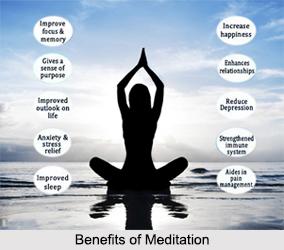 "Meditation is the dissolution of thoughts in Eternal awareness or pure consciousness without objectification, knowing without thinking, merging finitude in infinity". - Swami Sivananda.
"Meditation is the dissolution of thoughts in Eternal awareness or pure consciousness without objectification, knowing without thinking, merging finitude in infinity". - Swami Sivananda.Meditation is an intense spiritual as well as personal experience. Meditation may be described as a state of concentrated attention on a thought or on awareness. This thought process is, to turn the attention inward, to the mind itself. Meditation is used for personal development, better concentration, to achieve peace and harmony for spiritual closeness to God, to become healthier and even to impart calmness, love, purity, well being and truthfulness.
Etymology of Meditation
The word Meditation comes from the Latin word ‘meditatio’, which originally indicated any physical or mental exercise that is done scientifically. Meditation is considered to be the component of Eastern religion, where it has been practiced for more than 5000 years. Later the concept evolved into the more specific meaning, "contemplation", where awareness is brought forward on the reality of the present moment without deliberately encouraging imagination.
Meaning of Meditation
One of the meanings of the word meditation is to control the activities of the mind, speech and body. Steadying the mind or focusing the concentration is one of the prime objectives of meditation.
Thus, meditation can be termed as any one of the following:
A state of relaxed concentration over one’s mind while keeping the reality of the present moment intact A state of freedom of the mind, when the person’s mind is free of any kind of thoughts A state of spiritual concentration, which brings one closer to God. A state of concentration which helps one focus the mind on a single object or thought A state of detachment from the outside world, pressure and tensions A state of attaining not only a healthy mental condition but physical growth as well A process, which makes one look towards the positive side of the world, keeping all the negativity behind
Stages of Meditation
 All of the above teamed with various process and types of meditation go a very long way in enhancing ones personality, changing ones attitude towards life, encouraging someone and building inner growth related to self-confidence and motivation. Posture, preparation, length of the period of the practice of meditation, all contribute to various forms of meditation like the Transcendental Meditation, Yoga Nidra, Vipassana and Mindfulness Meditation. While meditation is a continuous process, it can be said to have three stages:
All of the above teamed with various process and types of meditation go a very long way in enhancing ones personality, changing ones attitude towards life, encouraging someone and building inner growth related to self-confidence and motivation. Posture, preparation, length of the period of the practice of meditation, all contribute to various forms of meditation like the Transcendental Meditation, Yoga Nidra, Vipassana and Mindfulness Meditation. While meditation is a continuous process, it can be said to have three stages:
Concentration (Dharana) Meditation (Dhyana) and Enlightenment or absorption (Samadhi)
Once the attention gets intermeshed then concentration slowly turns into meditation or dhyana. It is then the person who effortlessly merges with the object of concentration, which might either be the present moment or could be the Divine Entity.
Stages of Meditation
 All of the above teamed with various process and types of meditation go a very long way in enhancing ones personality, changing ones attitude towards life, encouraging someone and building inner growth related to self-confidence and motivation. Posture, preparation, length of the period of the practice of meditation, all contribute to various forms of meditation like the Transcendental Meditation, Yoga Nidra, Vipassana and Mindfulness Meditation. While meditation is a continuous process, it can be said to have three stages:
All of the above teamed with various process and types of meditation go a very long way in enhancing ones personality, changing ones attitude towards life, encouraging someone and building inner growth related to self-confidence and motivation. Posture, preparation, length of the period of the practice of meditation, all contribute to various forms of meditation like the Transcendental Meditation, Yoga Nidra, Vipassana and Mindfulness Meditation. While meditation is a continuous process, it can be said to have three stages:Once the attention gets intermeshed then concentration slowly turns into meditation or dhyana. It is then the person who effortlessly merges with the object of concentration, which might either be the present moment or could be the Divine Entity.
For more, visit the link below: